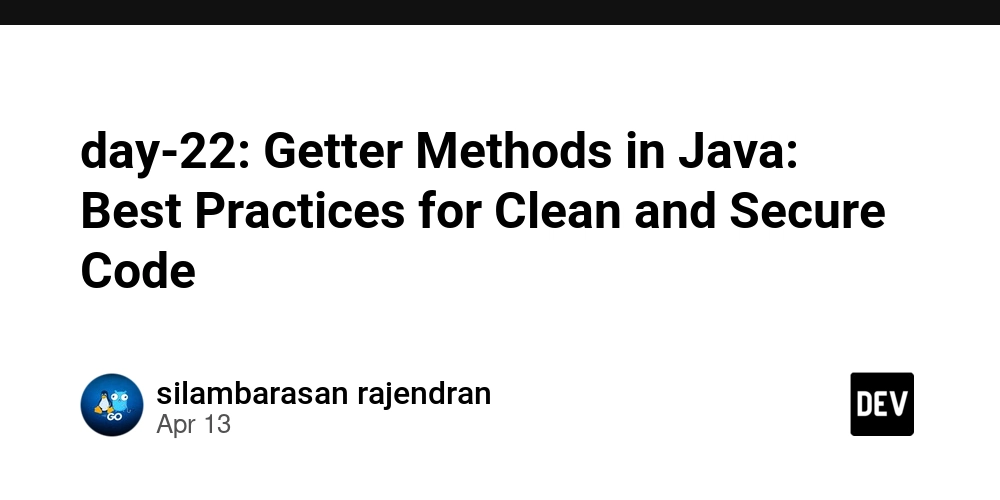day-22: Getter Methods in Java: Best Practices for Clean and Secure Code
Getter Method in Java (Simple Explanation) A getter method is a public method that provides controlled read access to a private field in a class. Why Use a Getter? Encapsulation → Keeps fields (private) hidden but allows safe access. Security → Prevents direct modification of sensitive data. Flexibility → You can later add logic (e.g., formatting, validation) without breaking existing code. Example: Getter for goldRate public class SriKumaranTangaMaligai { private int goldRate = 5000; // Private field (hidden) // Getter method (read-only access) public int getGoldRate() { return goldRate; // Returns the value of goldRate } } How to Use the Getter? public class User { public static void main(String[] args) { SriKumaranTangaMaligai shop = new SriKumaranTangaMaligai(); // Access goldRate via getter (not directly) System.out.println("Gold Rate: ₹" + shop.getGoldRate()); } } Key Points ✔ Naming Convention: Getters start with get + FieldName (e.g., getGoldRate). ✔ Return Type: Matches the field’s type (int, String, etc.). ✔ No Parameters: Getters only return values (no arguments). Getter vs. Direct Public Access Approach Pros Cons Getter (getGoldRate()) Safe, controlled, future-proof Slightly more code Public Field (goldRate) Shorter, faster No validation, breaks encapsulation When to Avoid Getters? In high-performance code where direct access is critical. For simple data containers (use Java record instead)

Getter Method in Java (Simple Explanation)
A getter method is a public method that provides controlled read access to a private field in a class.
Why Use a Getter?
Encapsulation → Keeps fields (private) hidden but allows safe access.
Security → Prevents direct modification of sensitive data.
Flexibility → You can later add logic (e.g., formatting, validation) without breaking existing code.
Example: Getter for goldRate
public class SriKumaranTangaMaligai {
private int goldRate = 5000; // Private field (hidden)
// Getter method (read-only access)
public int getGoldRate() {
return goldRate; // Returns the value of goldRate
}
}
How to Use the Getter?
public class User {
public static void main(String[] args) {
SriKumaranTangaMaligai shop = new SriKumaranTangaMaligai();
// Access goldRate via getter (not directly)
System.out.println("Gold Rate: ₹" + shop.getGoldRate());
}
}
Key Points
✔ Naming Convention: Getters start with get + FieldName (e.g., getGoldRate).
✔ Return Type: Matches the field’s type (int, String, etc.).
✔ No Parameters: Getters only return values (no arguments).
Getter vs. Direct Public Access
Approach Pros Cons
Getter (getGoldRate()) Safe, controlled, future-proof Slightly more code
Public Field (goldRate) Shorter, faster No validation, breaks encapsulation
When to Avoid Getters?
In high-performance code where direct access is critical.
For simple data containers (use Java record instead)


.jpg)

























![[Webinar] AI Is Already Inside Your SaaS Stack — Learn How to Prevent the Next Silent Breach](https://blogger.googleusercontent.com/img/b/R29vZ2xl/AVvXsEiOWn65wd33dg2uO99NrtKbpYLfcepwOLidQDMls0HXKlA91k6HURluRA4WXgJRAZldEe1VReMQZyyYt1PgnoAn5JPpILsWlXIzmrBSs_TBoyPwO7hZrWouBg2-O3mdeoeSGY-l9_bsZB7vbpKjTSvG93zNytjxgTaMPqo9iq9Z5pGa05CJOs9uXpwHFT4/s1600/ai-cyber.jpg?#)












































































































































![[The AI Show Episode 144]: ChatGPT’s New Memory, Shopify CEO’s Leaked “AI First” Memo, Google Cloud Next Releases, o3 and o4-mini Coming Soon & Llama 4’s Rocky Launch](https://www.marketingaiinstitute.com/hubfs/ep%20144%20cover.png)





























































































































![[FREE EBOOKS] Machine Learning Hero, AI-Assisted Programming for Web and Machine Learning & Four More Best Selling Titles](https://www.javacodegeeks.com/wp-content/uploads/2012/12/jcg-logo.jpg)








































































![Rogue Company Elite tier list of best characters [April 2025]](https://media.pocketgamer.com/artwork/na-33136-1657102075/rogue-company-ios-android-tier-cover.jpg?#)








































































_Andreas_Prott_Alamy.jpg?width=1280&auto=webp&quality=80&disable=upscale#)






























































































![What’s new in Android’s April 2025 Google System Updates [U: 4/18]](https://i0.wp.com/9to5google.com/wp-content/uploads/sites/4/2025/01/google-play-services-3.jpg?resize=1200%2C628&quality=82&strip=all&ssl=1)










![Apple Watch Series 10 Back On Sale for $299! [Lowest Price Ever]](https://www.iclarified.com/images/news/96657/96657/96657-640.jpg)
![EU Postpones Apple App Store Fines Amid Tariff Negotiations [Report]](https://www.iclarified.com/images/news/97068/97068/97068-640.jpg)
![Apple Slips to Fifth in China's Smartphone Market with 9% Decline [Report]](https://www.iclarified.com/images/news/97065/97065/97065-640.jpg)
































































































































